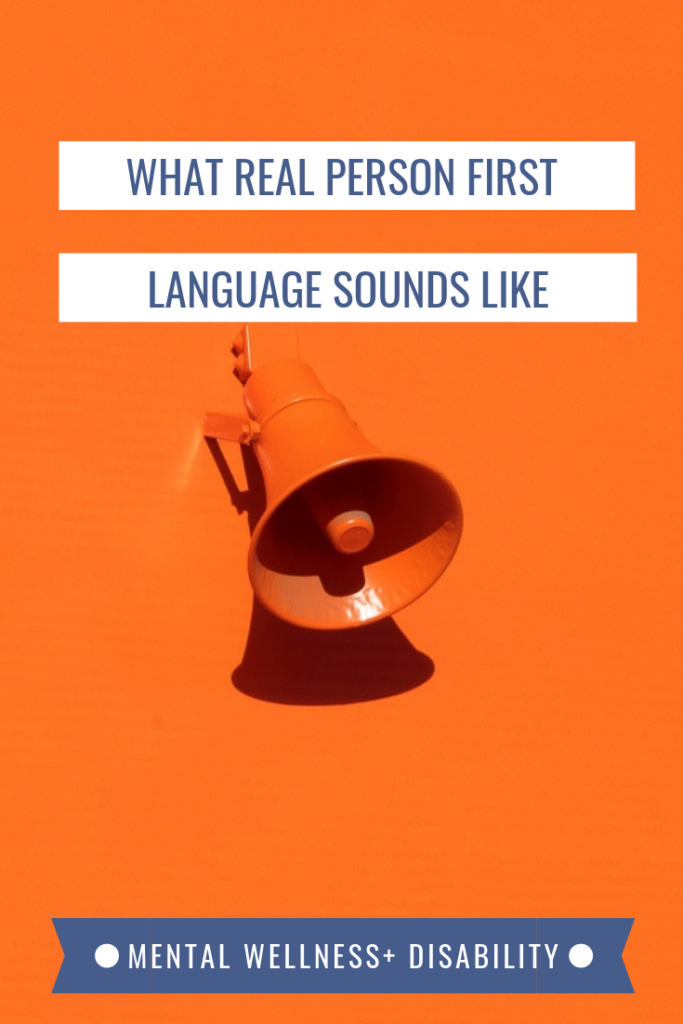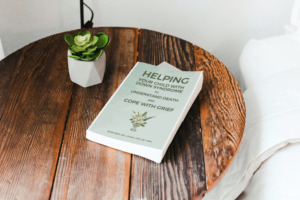Many people tell me they’re nervous about using the right language to describe disability. They don’t want to offend, and they don’t want to sound ignorant.
Most people know about the Euphemism Treadmill, the way that terms become so over-used that they become taboo. Words that are now considered offensive, like moron, idiot, mongoloid, and retarded were once medical terms used routinely by Doctors and advocates to describe what we now call Intellectual Disability.
It makes sense that with the revolving door of ‘correct’ terminology, people are worried they’ll say the wrong thing when talking to or about someone with a disability.
Many people with disabilities and those who advocate for them request that people use ‘Person First’ language (I’ll get to what exactly that is in just a sec). Read any online news article along the lines of ‘Police help autistic boy’, and you’ll notice the call for Person First language strewn throughout the comments section.
While traditional Person First language is what I use here on the blog, it is NOT how I talk about the real people who are my clients when I meet with them and their families and their doctors and their job coaches.
Because here’s the secret: You should talk about people with disabilities just like you would anyone else. That’s it.

The Four Ways that People Talk about Disabilities
Let’s imagine that your mother has cancer, and you’re going to introduce her to a friend. What would you say?
A) This is my cancerous mother.
B) This is my mother, she has cancer.
C) This is my mother, she’s chemotherapy dependent.
D) This is my mother, Maureen.
Now try this variation:
A) This is my Fragile X friend.
B) This is my friend, she has Fragile X syndrome.
C) This is my friend, she uses a picture board to communicate.
D) This is my friend, Beth.
Put this way, it’s obvious that Option D is how we’d all like to be introduced, how we’d like our mothers and our friends introduced.
Here’s what’s wrong with the alternatives
Option A in both examples puts the disability or disease ahead of the person; there’s an implication that the person cannot be separated from their disability, and that the disability is the primary thing someone needs to know about the person. This is the language that journalists most often use. Whether out of habit, because it is more sensational, or because it allows more words to be squeezed into a headline I’m not sure.
Option B in both cases is the traditional person first option; you’re introducing the person first, and then describing their disability or illness as a secondary piece of information. This is how you’ll hear the average parent of a child with a disability or professional support worker speak. This is the language that I use here on the blog when I’m discussing things in broad terms, because it’s what’s preferred by most of my clients.
Option C in both cases describes the person in terms of functional limitations; you’re not using a disability label, but you are sharing that the person needs something that most people don’t in order to get through the day. It’s rare to hear this, but when I do, it’s usually from fresh-out-of-or-still-in-grad-school clinicians who are attempting to avoid labels altogether and only speak in terms of what someone’s needs are.
What’s wrong with using the right words?
The problem with all of these is that in day to day conversations it’s almost never necessary to point out someone’s disability to another person. They will either be aware of it, they will pick up on it from context, or it won’t be necessary for them to know.
In most cases, it’s not your story to tell. The person with a disability will either be comfortable and willing to share their diagnosis, will be comfortable talking about their functional needs without labeling themselves, or will not be willing to discuss their disability.
In any case, it’s simply not necessary for anyone else to interject. In the real world, of course, it’s not as simple as using or not using the most correct term to talk to or about someone. It’s all about how you use it.
Imagine this time that you’re meeting someone new for the first time.
They glance at your bare ring finger and immediately say:
“You’re single? Oh you poor thing, don’t worry, he’s out there, there’s hope. I have a cousin who’s a spinster, I know all about what you’re going through. I don’t know how you girls do it; day in and day out without a soul mate or even someone to talk to…I don’t know if I’d have the strength to leave the house some days!”
Absurd, right?
This stranger has jumped to monumental conclusions about your marital status and history, your sexuality, and your personal fears and desires.
They have implied quite strongly that yours isn’t a life worth living.
They felt entitled to do so just by glimpsing your finger.
Now imagine that instead of a naked ring finger, what they notice about you first is your wheelchair.
“You’re crippled? Oh you poor thing, don’t worry, they’re doing amazing things with science and stem cells these days, there’s hope. I have a cousin who’s wheelchair-bound, I know all about what you’re going through. I don’t know how you people do it; day in and day out without being able to walk or even just stand up… I don’t know if I’d have the strength to leave the house some days!”
Just as absurd.
Way more common.
Changing the first sentence of that blather to “You’re a person who uses a wheelchair?” does not fix what’s wrong.
Person First language alone is not enough if your goal is to really put people first
Being truly person first has very little to do with terminology. Being truly person first would be to simply interact with the person as you would anyone else in the same situation. Make small talk, find common ground, tell a joke. The person will either bring up their disability…or they won’t.
Accept that that is their choice, and enjoy getting to know them.
If that’s difficult for you, consider this. You encounter dozens of people every day who have ‘hidden’ disabilities. PTSD, Cystic Fibrosis, and Epilepsy are just a few conditions that your grocer or neighbor or co-worker may have that you don’t know about. You don’t inquire about these disabilities or get nervous talking about them. You don’t know enough to care because you don’t see evidence of them.
All that people with obvious disabilities want is for you to give them the same consideration that you give everyone else. It has a little to do with the words you choose, but much more to do with the way you use them.
Side Note – The interesting argument against Person First language
In some disability communities, such as in Deaf culture and in Autistic communities, there’s a counterargument to Person First language.
The belief is that these disabilities are in fact an undeniable part of someone’s identity, and that it’s more true to say that someone is “Autistic”, because they do not see themselves outside of their Autism. They DO see Autism as the most important aspect of their personality and life, and so they choose to lead with that in describing themselves.
It’s a very hot topic at the moment, and there can be division over this even within families; parents who advocated for decades for their child to be called “a person with Autism” shudder and feel their hackles rise when their adult children prefer to be called “Autistic”.
So, what do you do as an outsider not sure which camp someone belongs to?
I’m assuming that you’re interested in my $0.02 if you’ve read this far, so, here it is: Stick to traditional Person First language while actively listening to how a person talks about themselves. This usually gives you all the guidance you need to know their language preferences.
If you’re still not sure, and you’re in a position to TRULY NEED to, it’s OK to ask about their terminology preferences. Actually, it’s more than OK; it’s the right thing to do, and they won’t be offended by your asking.
Does that clear things up? Or does it make it seem even stickier to talk to and about people with disabilities?
Leave a comment and let me know, I’d love to hear from you!



